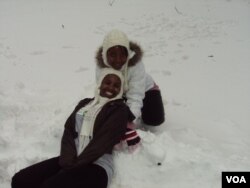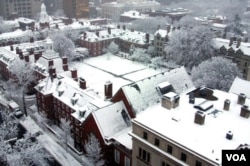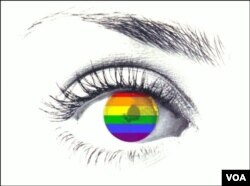I smile wryly as I go through my freshman photos. It is hard to believe that just 2 years ago, I arrived in the United States, fresh-faced and starry eyed; weighed down by suitcases, expectations and an overwhelming fear of the unknown. In my head, as well as in my diary and journal, was a clear strategy of how I would 'attain greatness'.
It amazes me to look back and realize how drastically my interests have changed, how dramatically my intellectual aspirations have evolved and how even my fears are not the same anymore. The certainty I once had about what I wanted to see and achieve is gone, the answers replaced by more and more questions about myself and my path.
After the snow
Prior to my arrival in the States, I had only seen snow on television. It was with great anticipation and excitement that I waited for the first snowy day. I vividly recall my first encounter with snow: It was one of those mornings when I would steal glances at the rising sun from behind my computer while frantically working to finish a paper. From my common room window, I noticed the ice crystals slowly dropping to the ground.
The sight was breathtaking. I dropped all my work, raced to the window; and saw that Yale's courtyard had been transformed into a picturesque scene from a Disney movie. The beauty of what I was seeing almost moved me to tears.
Of course, the novelty has long since worn off. With snow comes the obligation to wear layers of coats, all of which have to be removed upon entering a building. There is also the hassle of having to trudge to class in ridiculous snow boots. And after a snow comes the 'freezing rain,' which covers the roads with ice, turning the simple task of walking into a Hunger Games-esque challenge.
These days, my heart sinks when I see the snow. My optimism dies. My enthusiasm welters and I just want to go home.
Fearing the cold
Having never encountered snow before, I was afraid that when the snow did come, I would freeze. Today, I worry about a different kind of cold I hadn’t encountered before America. My fear has evolved into a paranoid feeling that the cold, impersonal nature of most Americans is going to smother the warmth out of me.
America is a very cold country. Relationships and human interactions which should be warm and earnest often come off as superficial. Only in America does, “Let’s have dinner together sometime” signal the end of a conversation, not an actual invitation to catch up over food.
The predominant individualistic nature of most Americans makes me yearn for Africa's ubuntu society. Ubuntu, is a communal social philosophy which emphasizes that a person is a person because of the people around him. Ubuntu calls upon people to belive that “Your pain is my pain. My wealth is your wealth. Your salvation is my salvation.”
It is a concept so impalpable to Americans that my American roommate looks at me in consternation whenever she sees my Zimbabwean friend Nod’s belongings in our room. To her, it signals intimacy. For us, it is a mutual understanding that property rights do not exist between people who inhabit the same space. Having grown up in a family where clothes did not belong to the individual, but to the people who could fit into them, and having gone to boarding school where anything from lotion to school uniforms could be shared, navigating American laws of individualism has been as traumatizing as tightrope walking.
Everyone is so wrapped up in a cocoon of endless activities that they have no time to accommodate anyone else. Even in romantic relationships, many college students, perhaps too busy to invest in their attraction to someone else, resort to 'hooking up’ because it provides a channel to vent sexual frustration without having to deal with the emotional baggage that comes with a relationship.
One girl is admitted in hospital for a week, and her suitemate does not notice. Another frequently hooks up with a boy who confesses after a year that he is in a 3-year long-distance relationship. I shake my head.
Varieties of love
I also remember how fervently my family and I prayed that I would not get a homosexual roommate. I remember the confusion I felt when I unknowingly walked up to a LGBT stand during the extracurricular activity fair for freshmen students and had to politely talk to the representatives for 5 minutes.
I remember stopping in utter fascination as I watched a person, who I swear was male, strut to class in a dress and high heels.
My home country, Zimbabwe, is an intensely homophobic country. Not only is it illegal to be homosexual, but it also culturally and socially shunned. My society had taught me that gender and sexuality was not debatable. However, during the past two years, I have watched as people I knew came out.
I have sat in on intellectual and academic debates on homosexuality. I have made friends, loved them, discovered their sexuality, and realized that this does not change my opinion of them. I have had paralyzing crushes on boys who I later discovered to be gay, and I have questioned my own sexuality.
More questions than answers
It has definitely been a difficult 2 years. I have cried tears of joy, tears of pain, and tears of disappointment in myself, in Yale, in America, in Zimbabwe. For me, college has not been a place where I discovered myself. It is a place where I lost myself to the questions in my head. If Christianity was forced on Zimbabweans during colonialism, why do people still practice it? Should I wear my hoodie tonight? Is she attractive or am I attracted to girls?
I have also constantly questioned whether studying in the United States was a good decision. Will a 4 year absence from Zimbabwe empower me to serve it better? How will my 12 engineering classes in a liberal arts school stack up against 36 engineering classes and a 1 year internship at the University of Zimbabwe? After seeing all the opportunities in the United States, and after realizing the potential that I have, will I ever happily go back home where electricity and water shortages will force me to be less productive with my life?
I have been forced to defend my beliefs and to have an opinion on some concepts that I could not have cared less about. Sometimes, I have risen to the challenge – gone ice skating, dated outside my race, danced to Katie Perry. Other times, my only comfort being the knowledge despite feelings of a loss of identity; I have still retained an ability to be vulnerable in a land where everyone is “doing well.”
I look at the naïve girl in those freshman year pictures and sigh. Just when I knew all of life’s answers, they went and changed all the questions.
It amazes me to look back and realize how drastically my interests have changed, how dramatically my intellectual aspirations have evolved and how even my fears are not the same anymore. The certainty I once had about what I wanted to see and achieve is gone, the answers replaced by more and more questions about myself and my path.
After the snow
Prior to my arrival in the States, I had only seen snow on television. It was with great anticipation and excitement that I waited for the first snowy day. I vividly recall my first encounter with snow: It was one of those mornings when I would steal glances at the rising sun from behind my computer while frantically working to finish a paper. From my common room window, I noticed the ice crystals slowly dropping to the ground.
The sight was breathtaking. I dropped all my work, raced to the window; and saw that Yale's courtyard had been transformed into a picturesque scene from a Disney movie. The beauty of what I was seeing almost moved me to tears.
Of course, the novelty has long since worn off. With snow comes the obligation to wear layers of coats, all of which have to be removed upon entering a building. There is also the hassle of having to trudge to class in ridiculous snow boots. And after a snow comes the 'freezing rain,' which covers the roads with ice, turning the simple task of walking into a Hunger Games-esque challenge.
These days, my heart sinks when I see the snow. My optimism dies. My enthusiasm welters and I just want to go home.
Fearing the cold
Having never encountered snow before, I was afraid that when the snow did come, I would freeze. Today, I worry about a different kind of cold I hadn’t encountered before America. My fear has evolved into a paranoid feeling that the cold, impersonal nature of most Americans is going to smother the warmth out of me.
America is a very cold country. Relationships and human interactions which should be warm and earnest often come off as superficial. Only in America does, “Let’s have dinner together sometime” signal the end of a conversation, not an actual invitation to catch up over food.
The predominant individualistic nature of most Americans makes me yearn for Africa's ubuntu society. Ubuntu, is a communal social philosophy which emphasizes that a person is a person because of the people around him. Ubuntu calls upon people to belive that “Your pain is my pain. My wealth is your wealth. Your salvation is my salvation.”
It is a concept so impalpable to Americans that my American roommate looks at me in consternation whenever she sees my Zimbabwean friend Nod’s belongings in our room. To her, it signals intimacy. For us, it is a mutual understanding that property rights do not exist between people who inhabit the same space. Having grown up in a family where clothes did not belong to the individual, but to the people who could fit into them, and having gone to boarding school where anything from lotion to school uniforms could be shared, navigating American laws of individualism has been as traumatizing as tightrope walking.
Everyone is so wrapped up in a cocoon of endless activities that they have no time to accommodate anyone else. Even in romantic relationships, many college students, perhaps too busy to invest in their attraction to someone else, resort to 'hooking up’ because it provides a channel to vent sexual frustration without having to deal with the emotional baggage that comes with a relationship.
One girl is admitted in hospital for a week, and her suitemate does not notice. Another frequently hooks up with a boy who confesses after a year that he is in a 3-year long-distance relationship. I shake my head.
Varieties of love
I also remember how fervently my family and I prayed that I would not get a homosexual roommate. I remember the confusion I felt when I unknowingly walked up to a LGBT stand during the extracurricular activity fair for freshmen students and had to politely talk to the representatives for 5 minutes.
I remember stopping in utter fascination as I watched a person, who I swear was male, strut to class in a dress and high heels.
My home country, Zimbabwe, is an intensely homophobic country. Not only is it illegal to be homosexual, but it also culturally and socially shunned. My society had taught me that gender and sexuality was not debatable. However, during the past two years, I have watched as people I knew came out.
I have sat in on intellectual and academic debates on homosexuality. I have made friends, loved them, discovered their sexuality, and realized that this does not change my opinion of them. I have had paralyzing crushes on boys who I later discovered to be gay, and I have questioned my own sexuality.
More questions than answers
It has definitely been a difficult 2 years. I have cried tears of joy, tears of pain, and tears of disappointment in myself, in Yale, in America, in Zimbabwe. For me, college has not been a place where I discovered myself. It is a place where I lost myself to the questions in my head. If Christianity was forced on Zimbabweans during colonialism, why do people still practice it? Should I wear my hoodie tonight? Is she attractive or am I attracted to girls?
I have also constantly questioned whether studying in the United States was a good decision. Will a 4 year absence from Zimbabwe empower me to serve it better? How will my 12 engineering classes in a liberal arts school stack up against 36 engineering classes and a 1 year internship at the University of Zimbabwe? After seeing all the opportunities in the United States, and after realizing the potential that I have, will I ever happily go back home where electricity and water shortages will force me to be less productive with my life?
I have been forced to defend my beliefs and to have an opinion on some concepts that I could not have cared less about. Sometimes, I have risen to the challenge – gone ice skating, dated outside my race, danced to Katie Perry. Other times, my only comfort being the knowledge despite feelings of a loss of identity; I have still retained an ability to be vulnerable in a land where everyone is “doing well.”
I look at the naïve girl in those freshman year pictures and sigh. Just when I knew all of life’s answers, they went and changed all the questions.






